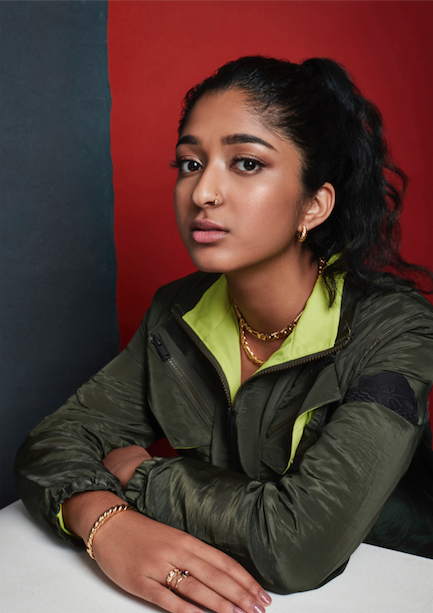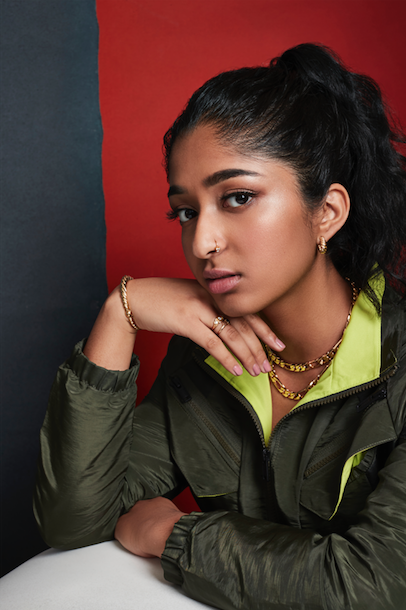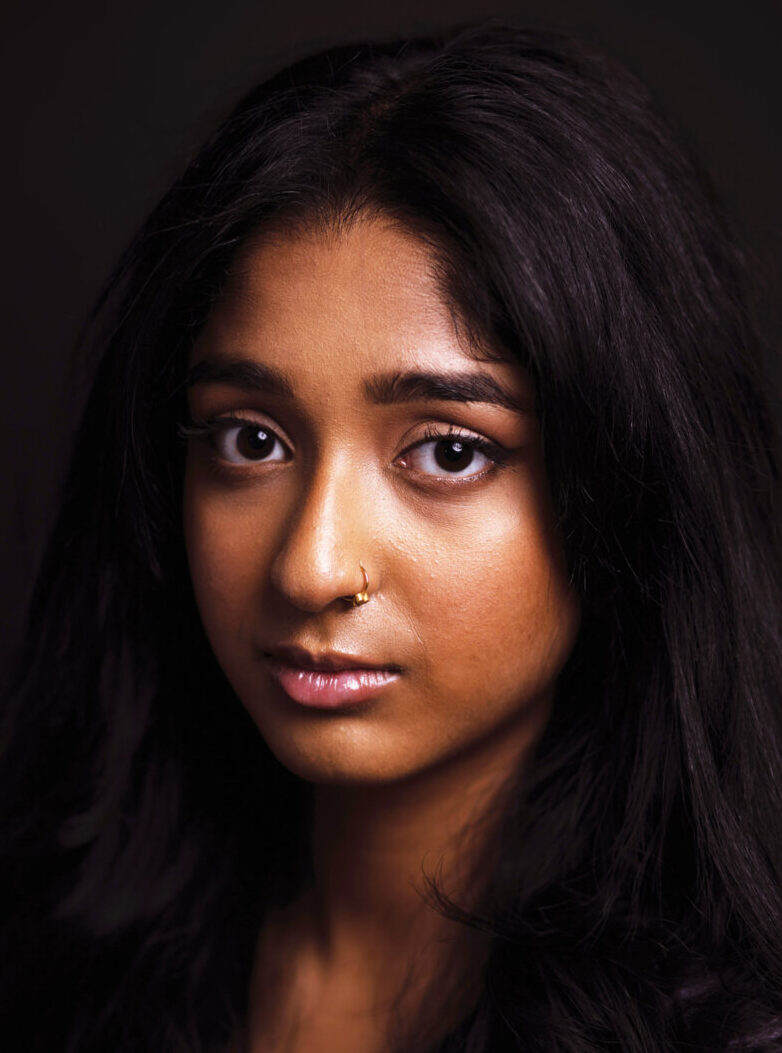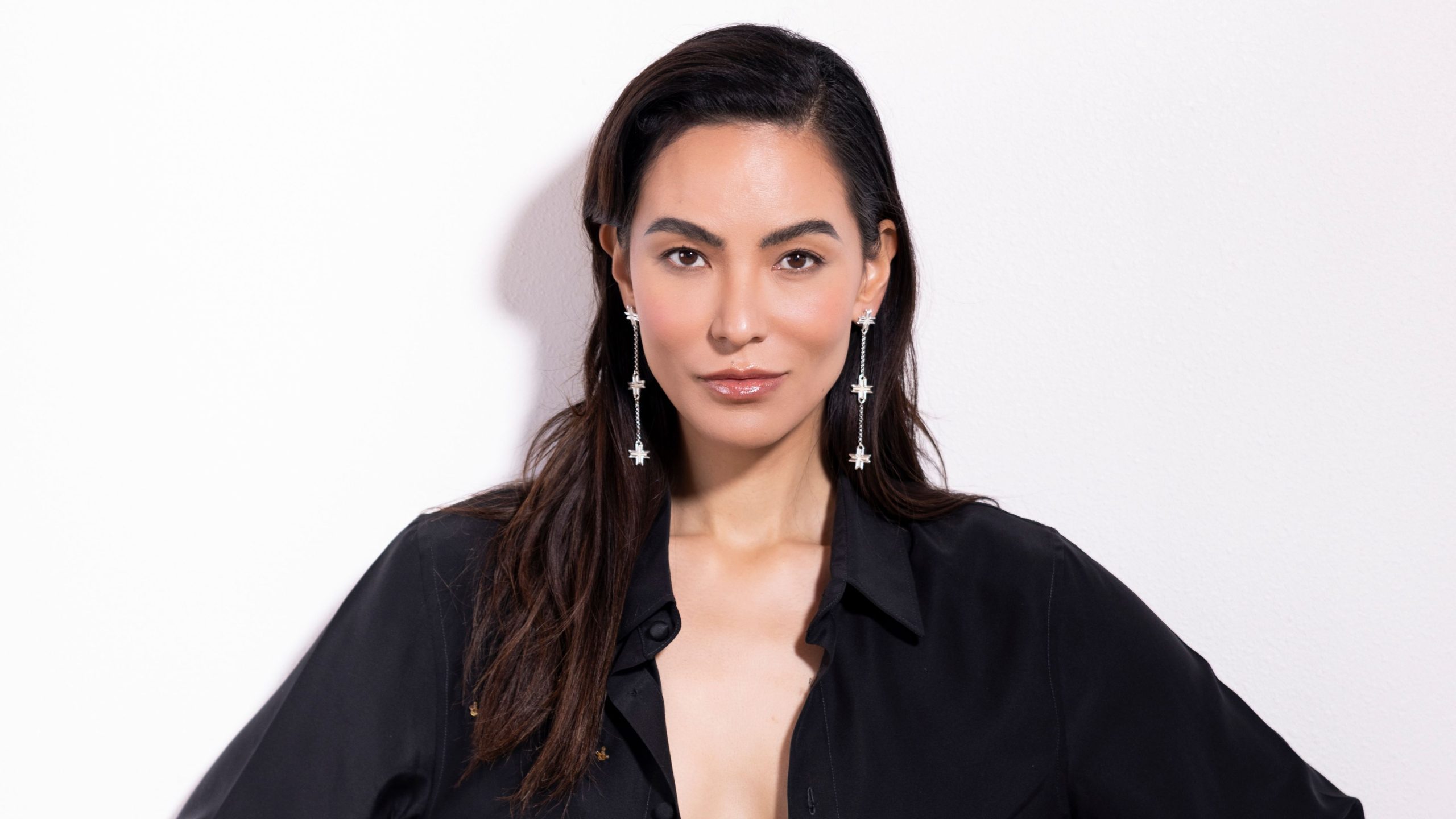Once-in-a-lifetime opportunities are just that—opportunities so rare, you’re lucky if you ever get the chance to come across them. So, what happens if you find yourself fortunate enough to come face-to-face with one? In the case of Maitreyi Ramakrishnan, you don’t change a thing.
Beating out 15,000 other girls, Ramakrishnan got the role of a lifetime by being her authentic self. The Mississauga-born native was handpicked to lead Mindy Kaling’s coming-of-age series Never Have I Ever (a show about navigating the ups and downs of teenage life told through the lens of a first-gen Indian-American), which debuted earlier this year on Netflix to the tune of 40-million views—not bad for a first-time role.
For Ramakrishnan, this is just the beginning. It’s an opportunity to not only make her mark on Hollywood, but also join a new wave of talent that is redefining the industry and the stories being told.


“Whoa. Oh my god. People know my face. This is crazy.”
So says Maitreyi Ramakrishnan, the 18-year-old Mississauga-born and bred theatre kid-turned-legit ingénue who hit it big when she was cast as the lead in Mindy Kaling’s latest series, Netflix’s Never Have I Ever. The nuanced coming-of-age sitcom inspires as many tears as laughs, thanks to its focus on Devi Vishwakumar, a first-generation Indian-American teen who is attempting to make it through high school while working through her grief for her late father.
Since its debut in April, the series has been viewed by 40-million households, making Ramakrishnan a household face.
“They said, ‘Thank you so much for the show. It just means so much to me what you do,’” she recalls. “I realized a lot of people were starved for this representation, but I’m glad it’s finally come.”
I realized how normalized I made it for myself to not see somebody like me on TV
As a Tamil-Canadian actress, Ramakrishnan remembers growing up without seeing many South Asian actors on television. For her, this role is more than just her first time on screen. It’s a fight for more.
“I realized how normalized I made it for myself to not see somebody like me on TV,” she says in a signature suburban Toronto lilt. “They’re all usually white characters, but I realized after the show came out how little there is and how much of an effect that has had on me. I try not to dwell on the fact that I didn’t get this representation when I was younger, but the fact that my little cousin will.”


It’s a hefty weight to be changing the literal face of television. But while Ramakrishnan is happy to shoulder some of it, she’s also sticking true to being herself. Which was, incidentally, Kaling’s advice.
“I remember the first time I saw a South Asian character on screen,” she recalls. Cue Harry Potter’s infamous (and rather dull) Patil twins, Parvati and Padma. “I remember being let down, and I was just a kid. I was like, okay, I’m Hermione anyways, what’s up girl? ‘Cause I was like, what is this? Brown girls just simping over Harry and Ron. This is all we get? But when it came to portraying Devi, the biggest thing I always had in my head was just [to] make a real character, because you can’t possibly make a character that everybody will be able to relate to. I stayed true to what I know.”
Brown women, after all, are not a monolith. We come in many different shapes and shades, experiences, and histories. Still, Ramakrishnan is a step forward for the community—as an individual. Her vibrant, spunky personality is reminiscent of many young stars before her—the Mileys, the Selenas, the Demis. But with her eagerness to find the truth in her character and with a name you’d be hard-pressed to find on a keychain (much less a marquee) she’s an inspiration to brown girls most of all.
And that’s Ramakrishnan’s mission: already accomplished. While it’s far from her responsibility to be a face of this change, it’s one she’s chosen. And part of that is due to having a family who have supported her no matter what her dreams have been, doctors and lawyers (and all those stereotypical dreams of immigrant parents) be damned. Instead, she opted for piano and ballet lessons, and her parents supplied her with all the art supplies she could possibly need that one time she thought she wanted to be an animator.


“They always said, ‘As long as you do the best job that you possibly can to get the dream job you want, that’s what matters. Do whatever you want, but do the best job.’”
Indeed, as one of many leaders of a new generation, Ramakrishnan is a sign of the importance and impact of diversity. She is proof that there is more to come, more opportunity to be recognized for the multitudes that we contain. To be less of a sidekick and more of a star like Kaling before her, and without whom there may not be a path.
“Having that sense of responsibility to always do the best that we can, putting the best foot forward and trying our best not to misrepresent, [Mindy and I] have definitely had that conversation,” Ramakrishnan says. “I remember one time, she was applauding me, saying, ‘Oh my god, I’m so proud of you. I can’t believe you’re doing this at such a young age. I could never do this.’ And then I’m, like, ‘Bro, you did this when it was like years ago, when it was way harder to do this. You’re the OG pioneer here. I’m on your shoulders.’”
And that’s a top-down impact, one Ramakrishnan says she’s “blessed” to have experienced as a first-time actor.
“Whenever Mindy walks on set, everybody has so much respect for her because she truly respects and values the opinions of everybody,” says Ramakrishnan. “She doesn’t shut down anyone. She takes the time to know everybody’s name. And that respect is clearly shown whenever she comes on set, everybody loves and adores her. I think that really speaks to how she leads, the whole environment is really welcoming.”
It’s a sign of the way all workspaces could be—if inclusivity just had a seat at the table. While not all of us might be working under stage lights day to day, Hollywood does have a habit of mirroring and influencing real life, from the way we dress to the way we talk to the way we work. We know that when men and women of colour lead film and television sets, like Kaling or director Ava DuVernay (who only ever opts for female directors on her series Queen Sugar), change trickles down to box-office rewards.
RELATED: How Wes Hall Plans to Rebuild the Boardroom with BlackNorth
Similarly, workplaces with more diverse management teams have proven to lead to better performance from employees overall—and higher profitability. After all, a more diverse team means a range of ideas and perspectives, and a more accurate representation of society, like that of Devi in Never Have I Ever, who offers a glimpse into Indian-American life so few series have offered before it.
There’s no mistaking, then, that representation in media matters. By starring in a Netflix series that has found popularity around the world, Ramakrishnan is fronting a new wave, one that promises inclusivity.


But part of the goal for real representation, says Ramakrishnan, is to not simply be filling a diversity gap but to be ourselves. For her, that means playing roles that aren’t exclusive to her ethnicity but simply are. Which isn’t to say she shies away from her Tamil roots—far from it. Ramakrishnan owns who she is, every spirited bit.
Part of that has meant learning how to straddle the East and the West as a child of immigrants. It’s a careful tightrope walk, one many of us are more than familiar with.
“I remember when I was younger, other Tamil classmates of mine, they would go for Bharatanatyam [a classic Tamil dance] lessons or Tamil school. But I never really did any of that. I loved Scouts as a kid, and I loved playing the piano. I remember having this idea that there’s a checklist to be Tamil; you have to play this instrument, speak the language, be able to dance. But I wasn’t checking those boxes. I felt like, I wasn’t Tamil enough. But now I’m like, no, screw that! Being Tamil is so much more than just a checklist. I know in my heart that being Tamil is whatever that means to me as an individual.”
I remember having this idea that there’s a checklist to be Tamil; you have to play this instrument, speak the language, be able to dance. But I wasn’t checking those boxes. I felt like, I wasn’t Tamil enough.
There’s an unmistakable pride in Ramakrishnan’s voice, and it grows stronger as she delves into what it means now to be a Tamil woman with a platform.
“I’ve got power in the sense that I’ve got attention, and I gotta use that for good,” she says. “I want to continue to play roles that will bring attention to the Tamil community. I want to play a character that maybe necessarily wasn’t written as Tamil, but because I play it, it’s a Tamil character.”
All of which is to say: this brown girl from Mississauga can play anyone she wants. And if that makes another brown girl from just about anywhere feel like she can be anyone she wants to be, that’s a step in the right direction.
“We’re so diverse, we have a lot of stories to tell,” says Ramakrishnan, as a Tamil-Canadian. “Maybe there’s a sense of being the underdog. But I’m just from Mississauga, and I made my tape in a community centre. Talent truly can come from anywhere. I always say, every good cast has at least one Canadian. So you’re welcome. You can thank me later.”
Cue a chuckle, ripe with the “spunk and sass” Devi not so coincidentally mirrors.
What makes talent game-changing (as Kaling advised) is authenticity, and what helped Ramakrishnan beat out 15,000 other girls for a role. Simply by being herself, Ramakrishnan is a long-awaited leader for many.


“I’ve made it this far being myself,” she says, noting that, as she grows older, how she defines herself will change, and that’s okay too. “Your identity is constantly changing as you go through life. It’s like going to the doctor every so often. You’ve got to do a check-up because it can change-up.”
For a young South Asian to be granted a stage where she can grow and change is revolutionary in no small part. And, hopefully, a new normal.
That might sound like a grandiose mission, but Ramakrishnan isn’t sweating it.
“I feel like one day I’ll wake up and I’ll say my mission is to just get out of bed. One day, it’ll be to get an Oscar, you know? But I think the real mission is to keep taking up space.”













